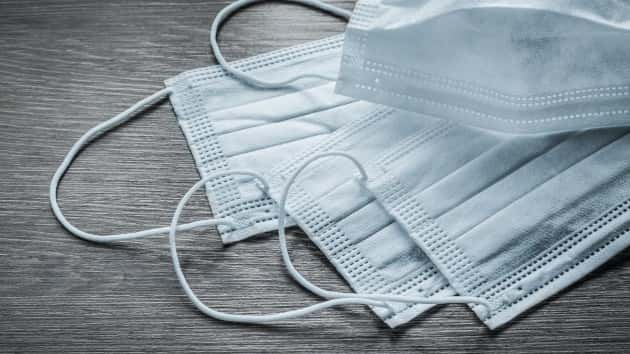
mihalec/iStock(NEW YORK) — Doctors and nurses on the front lines of the battle against coronavirus are increasingly anguished over the hospital-imposed rationing of masks, gowns and other protective gear, restrictions they say are exposing them to unnecessary risks at the worst possible time.
At Anne Arundel Medical Center in Annapolis, two nurses said they were being handed a single mask in a brown paper bag at the start of each shift and told to make it last. At Medstar Georgetown University Hospital in Washington, D.C., the more protective masks, known as N95s, are being kept in a locked room, according to one neurologist who agreed to speak anonymously about his growing unease.
They understand the shortages, several of the medical workers said, but if they get sick, the coming surge will be that much harder to manage.
“I’m not trying to point fingers,” the neurologist said. “Friends all over the country are asking me the same thing. Why are we not protecting the physicians?”
The careful rationing of protective gear has become widespread policy around the country, following guidelines from the Centers for Disease Control and Prevention that urged hospitals to marshal their resources ahead of an expected surge in infected patients.
Because many hospitals operate under strict rules that bar them from speaking out, nurses and doctors have been reluctant to talk publicly about their growing concerns. But in online forums and private social media groups, the discussions are revealing more and more anxiety.
“We are definitely feeling vulnerable and this week will be much worse,” wrote an anesthesiologist in Maine in a private Facebook group of doctors from around the country shared with ABC News.
“We are now creating our own [masks] with plastic bags rubber band and nasal cannula taped to the top of face shields,” wrote a Long Beach, California doctor in that same group.
Some hospital officials have questioned whether widespread use of protective masks is beneficial. UCI Health in Orange County, California even sent out guidelines calling constant mask usage by staff “harmful.”
“Constant masking creates and stokes a culture of fear,” reads the UCI Health guidance from March 18. “In China almost everyone wore masks and yet the virus raged on with worsening spread.”
At New York’s Presbyterian Hospital, an internal memo from the chief surgeon, pointed to an acute supply shortage. Dr. Craig Smith wrote that the hospital normally uses 4,000 regular surgical masks per day. But right now, they are consuming 40,000 masks each day, with the demand expected to grow to 70,000 per day.
“We’re told manufacturing is beginning to accelerate, but that relief is weeks away at best,” he wrote.
Providing medical staff even one mask to use each day is probably too much, Smith wrote, but “is an important concession to their emotional needs. In theory the mask is to be used only if the person becomes symptomatic.”
That reasoning is not providing comfort, though, to many frontline medical workers, who now believe they are being exposed to the virus every day they come to work.
”We are not prepared,” warned a caregiver in Fairfax, Virginia, who has treated coronavirus patients. “There has been panic and uneasiness among the critical care staff. We are used to panic mode. But when it comes to protecting ourselves, we are uneasy.”
At least one hospital chain, the nonprofit Partners Healthcare in Massachusetts, is opting for a different approach. In a recent coronavirus update tweeted out by doctors there, the hospital chain announced a “new surgical mask policy” that would require its medical staff to wear masks at all times.
“Given what we have learned about COVID-19, this universal mask approach will serve to protect our patients and other staff members should the healthcare worker have asymptomatic infection,” the memo says.
Copyright © 2020, ABC Audio. All rights reserved.
